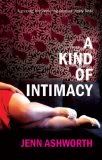Sunday, 6 June 2010
Book (Fiction) - A Kind of Intimacy, Jenn Ashworth.
 |
| Buy from Amazon |
Jenn Ashworth’s debut novel is a gluttonous, darkly comic fry-up with a congealed aftermath, leaving far worse than egg on her protagonist’s chins.
Rating: 3 stars out of 5
Annie, the unreliable narrator of this disturbing suburban grimoire combines the most shrewish and least desirable qualities in us all, except in her case there is arguably no counterbalance, no seed of redemption within the nettles of her personality. She is, it’s fair to say, a big fat Yang with no noticeable Yin. Whereas we might occasionally be mendacious but are kind to old people, she is not. Where we may ourselves scheme, twitch curtains, prowl, bear grudges, be sporadically deceitful and harbour notions of self-delusion in any combination, they tend to be things of the moment, mollified by some greater good. Hers aren’t.
Annie is both complex and childish, and even if this makes the things she does plausible, it is tempting to brand her rage-driven character and motives contrived. Jealousy, unrequited love, and retribution are foisted in turn, principally upon her new neighbours, placid Neil and his young fiery wife, Lucy. When she decides, after a rudely short time, that Neil is perfect for her and Lucy is holding him back, it proves a sublime, if squeamish taster for the fantasy banquet to follow. A delve into her less than idyllic past soon divests us of any notions of unoriginality, with unpalatable incursions into abuse, murder, and even a salacious involvement in the ‘fat porn’ industry.
It is Annie’s voice that is the key to credibility here, because she doesn’t see herself as a human repository of negative ills, just as we so often fail to acknowledge our own shortcomings. She relates them casually, conversationally, turning her most heinous flaws into fallible traits or justified actions. At the conclusion of an excruciating attempt at a housewarming, where she polishes off a whole tray of fairy cakes and two bottles of wine after the guests leave, then spends the next day vomiting and singing in a nightdress stupor, she explains her behaviour as: “An adolescent outpouring of youthful enthusiasm… cut short by my early marriage.”
With the invention of a daughter for the benefit of her new neighbours (arising, we assume, from the fruits of that early marriage, the true disastrousness of which we will eventually come to witness) she then spends a third of the book unconvincingly warding off questions concerning the child’s lack of visibility. It makes for a scummy layer of discomfort we can wince awkwardly at, like a pie-crust apprehensively cracked, its gray stew of plot cringing beneath, waiting to be savoured, or not.
You might be tempted to push your plate away from such stodgy fare, or to pick over the best bits, defaulting on the tasteless. Jenn Ashworth has not set out to sate us with choice cuts, though, but with clumps of noxious greens and arterial meat, sauced over with lashings of seediness and intrigue. Certainly, it is raw in places, where the fat-worshipper oversteps the mark, for example. “He raised his hand and slapped me across one eye, then the other. My teeth clicked against my tongue, my mouth filled with salt and my nose started bleeding.” Overcooked in others, especially in the limitless quotes from Annie’s self-help books which long outlive their character-defining usefulness.
Ultimately, though, the novel succeeds from its sheer number and variety of courses - all, you come to realise, suspiciously tainted in some way, testing even the strongest of appetites. Regardless of how marginally you empathise with Annie, one thing is certain: just when you think she can’t slurp up any more degradation, the plate is licked clean before you.
Subscribe to:
Post Comments (Atom)
Amazon Search
Blog Archive
-
▼
2010
(8)
-
▼
June
(8)
- Book (Fiction) - A Dark Matter, Peter Straub.
- Book (Fiction) - A Life of Pi. Yann Martel
- Game - Red Dead Redemption. Rockstar Games.
- Play - When Harry Met Sally - Opera House, Manches...
- TV - White Girl (2009)
- Play - A Midsummer Night's Dream - Octagon Theatre...
- Book (Poetry) - The World's Wife. Carol Ann Duffy.
- Book (Fiction) - A Kind of Intimacy, Jenn Ashworth.
-
▼
June
(8)
About Me

- Tony Foster
- Manchester, England, United Kingdom
- Writer, Father, student, career procrastinator.




0 comments:
Post a Comment